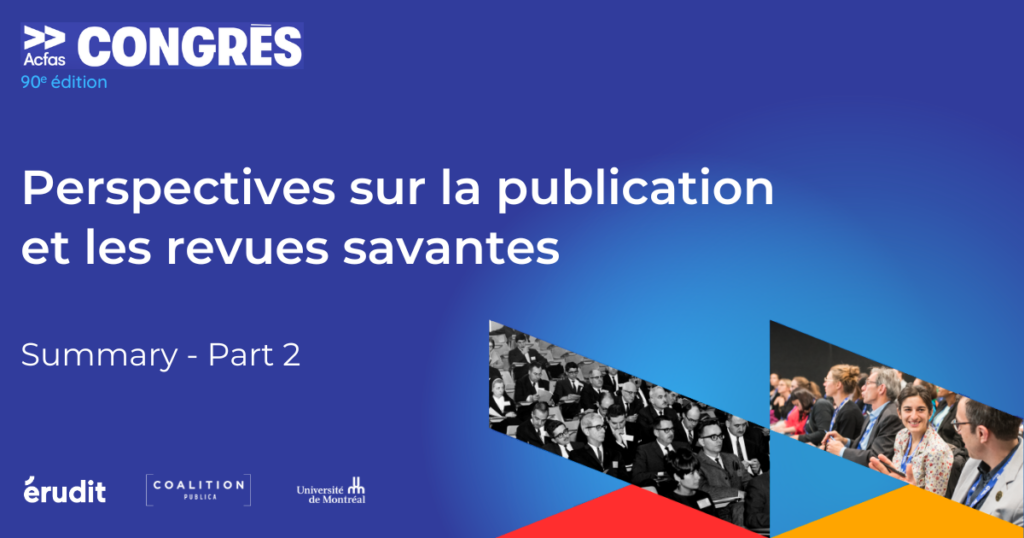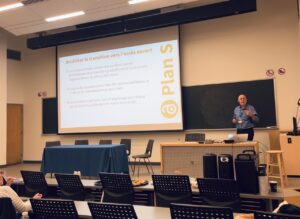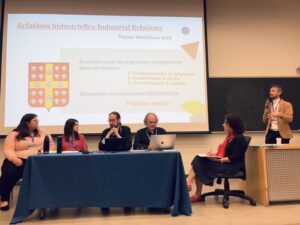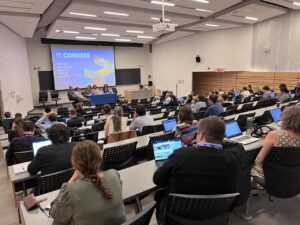
This conference, titled Perspectives sur la publication et les revues savantes : évolution du libre accès, des pratiques d’évaluation et des nouvelles possibilités de recherche (Perspectives on Publishing and Scholarly Journals: Evolution of Open Access, Evaluation Practices and New Research Possibilities), held on May 11 and 12, 2023, as part of the Annual Conference of the Acfas (Association francophone pour le savoir), was organized by the Érudit team under the scientific leadership of Vincent Larivière, professor at the Université de Montréal and the UNESCO Chair in Open Science. Journals took centre stage during those two days, which saw gathered a large number of stakeholders from the world of scholarly publishing in Quebec, Canada and abroad.
Plan S, a Lever for the Transition to Open Access
 The presentation by Johan Rooryck (cOAlition S—ESF) focused on the principles and objectives of Plan S created by cOAlition S, a grouping of European research funding agencies. Born from the frustration toward the low proportion of the world’s research being published in open access, a mere 55% twenty years after the Budapest Open Access Initiative in 2002, Plan S aims to accelerate the transition of scholarly publication to open access. At first, hybrid journals seemed like a promising way to make this shift. These are journals that restrict access to most articles to those willing to pay a subscription, but which offer some articles in open access if the author pays a publishing fee (Article Processing Charges, APC). However, open access rates have now stagnated, while the increase in the price of both subscriptions and APCs has been proved uncontrollable. In parallel, research teams are trapped by evaluation methods based on questionable commercial metrics like the Impact Factor. Plan S lays out three possible paths for open access: (1) gold or diamond open access, (2) institutional directories in open access and (3) journals covered by transformative agreements. This third path has proved disappointing as well, as in reality, it maintains the hybrid journal model, and so cOAlition S will be retracting its support for it in December 2024. Built around the notion of generalizing open access, Plan S aims to help the academic community regain the initiative in scholarly publishing, relying on a strategy of not transferring copyright to journals, especially those that belong to multinational commercial publishers. And so, beyond immediate open access for articles, Plan S also champions the use of the Creative Commons By Attribution (CC-BY) license. Based on the observation that only diamond open access makes publishing truly equitable and rooted in research communities, and that it constitutes the only way to ensure real bibliodiversity, especially linguistic diversity, Plan S supports the strengthening of non-commercial distribution infrastructure such as Érudit. Yet, while diamond open access is the most widespread model worldwide, it remains very fragmented, and journals need to band together, as they share many of the same challenges.
The presentation by Johan Rooryck (cOAlition S—ESF) focused on the principles and objectives of Plan S created by cOAlition S, a grouping of European research funding agencies. Born from the frustration toward the low proportion of the world’s research being published in open access, a mere 55% twenty years after the Budapest Open Access Initiative in 2002, Plan S aims to accelerate the transition of scholarly publication to open access. At first, hybrid journals seemed like a promising way to make this shift. These are journals that restrict access to most articles to those willing to pay a subscription, but which offer some articles in open access if the author pays a publishing fee (Article Processing Charges, APC). However, open access rates have now stagnated, while the increase in the price of both subscriptions and APCs has been proved uncontrollable. In parallel, research teams are trapped by evaluation methods based on questionable commercial metrics like the Impact Factor. Plan S lays out three possible paths for open access: (1) gold or diamond open access, (2) institutional directories in open access and (3) journals covered by transformative agreements. This third path has proved disappointing as well, as in reality, it maintains the hybrid journal model, and so cOAlition S will be retracting its support for it in December 2024. Built around the notion of generalizing open access, Plan S aims to help the academic community regain the initiative in scholarly publishing, relying on a strategy of not transferring copyright to journals, especially those that belong to multinational commercial publishers. And so, beyond immediate open access for articles, Plan S also champions the use of the Creative Commons By Attribution (CC-BY) license. Based on the observation that only diamond open access makes publishing truly equitable and rooted in research communities, and that it constitutes the only way to ensure real bibliodiversity, especially linguistic diversity, Plan S supports the strengthening of non-commercial distribution infrastructure such as Érudit. Yet, while diamond open access is the most widespread model worldwide, it remains very fragmented, and journals need to band together, as they share many of the same challenges.
Link to the presentation
Transition to Open Access: the Perspective of Quebec-Based Scholarly Journals
 The afternoon of May 12 was devoted to two round-table discussions dedicated to Québec-based scholarly journals in the current context of widespread open access. These discussions were preceded by a presentation of the erudit.org platform by Tanja Niemann and Élise Bergeron (Érudit), a non-profit initiative rooted in the academic community since 1998 and which today disseminates more than 200 scholarly journals and close to 150,000 articles, 98% of which are in open access. For the 2021–2022 fiscal year, Érudit operated with a yearly budget of 4.3 million dollars funded by three sources: the founding universities (11%), research infrastructure grants (35%) and services offered to libraries and journals (54%). From this budget, a total of 2 million dollars was paid out to journals in the form of royalties for subscription-based journals, i.e., those with a 12-month moving wall, and open access support for the others. In the last few years, Érudit has focused its efforts on supporting journals as they transition to open access, with the Partnership for Open Access (POA) as a core component of these efforts. Developed in collaboration with libraries from the Canadian Research Knowledge Network (CRKN), the POA is a collective continuous financial support model for the Canadian journals disseminated through the Érudit platform. It brings together libraries and journals to create an environment of fair and sustainable open access in Canada. The first POA agreement was signed in 2018 for five years and offered a degree of financial predictability to journals considering a move to open access. This historic agreement has been extended until 2024, allowing both Érudit and the journals to adapt to changes in the various open access policies.
The afternoon of May 12 was devoted to two round-table discussions dedicated to Québec-based scholarly journals in the current context of widespread open access. These discussions were preceded by a presentation of the erudit.org platform by Tanja Niemann and Élise Bergeron (Érudit), a non-profit initiative rooted in the academic community since 1998 and which today disseminates more than 200 scholarly journals and close to 150,000 articles, 98% of which are in open access. For the 2021–2022 fiscal year, Érudit operated with a yearly budget of 4.3 million dollars funded by three sources: the founding universities (11%), research infrastructure grants (35%) and services offered to libraries and journals (54%). From this budget, a total of 2 million dollars was paid out to journals in the form of royalties for subscription-based journals, i.e., those with a 12-month moving wall, and open access support for the others. In the last few years, Érudit has focused its efforts on supporting journals as they transition to open access, with the Partnership for Open Access (POA) as a core component of these efforts. Developed in collaboration with libraries from the Canadian Research Knowledge Network (CRKN), the POA is a collective continuous financial support model for the Canadian journals disseminated through the Érudit platform. It brings together libraries and journals to create an environment of fair and sustainable open access in Canada. The first POA agreement was signed in 2018 for five years and offered a degree of financial predictability to journals considering a move to open access. This historic agreement has been extended until 2024, allowing both Érudit and the journals to adapt to changes in the various open access policies.
Link to the presentation
Journals took the floor with a first presentation by Francis Fortin (Université de Montréal), a member of the editorial board for Criminologie, Forensique et Sécurité (CFS), who gave a short overview of this newly created French-language journal. It is published in open access, under a CC-BY license with no fees for authors, who also retain their copyrights.
Link to the presentation
A round-table discussion followed, consisting of leads from three Quebec-based scholarly journals, giving their perspectives on open access as well as an overview of the work done relating to it. Marc-André Éthier (Université de Montréal) and David Lefrançois (Université du Québec en Outaouais) lead Revue des sciences de l’éducation, a journal founded in 1974, which publishes exclusively in French with a 12-month moving wall. Sarah-Maude Bélanger and Pénélope Chabot (Université de Sherbrooke) represented Revue de droit de l’Université de Sherbrooke, a journal founded in 1970, which publishes in English and French and which is now in immediate open access. Samuel Dinel (Université Laval) oversees Relations industrielles / Industrial Relations, a bilingual journal created in 1945 and which is now in open access. The panelists all mentioned having concerns and experiencing financial precariousness relating to the transition to open access, which requires ongoing support and visibility to cope with the upheavals associated with it.
Link to the presentations
The Scholarly Publishing Ecosystem and Support Structures for Journals
 In a context of constant change, which tends to destabilize long-standing practices for scholarly journal teams, it is important to highlight the various sources of support available for scholarly publishing in Quebec and Canada. Jessica Clark (Consortium Érudit) gave an overview of the services offered by Coalition Publica, a partnership established in 2017 between Érudit and the Public Knowledge Project (PKP). Coalition Publica promotes a fair and sustainable transition to open access through a national, open and non-profit infrastructure that brings together érudit.org and the open-source software Open Journal Systems (OJS), a tool for editorial management, for evaluation tracking and for communication with authors developed by PKP. The idea is to link the decentralized OJS environment, where Canadian journals exist apart from each other, with the centralized dissemination vector offered by Érudit, to consolidate and integrate the world of non-profit scholarly publishing in Canada. At the heart of this ecosystem are the journals and the researchers. It also includes funding agencies, who provide financial support to journals and help create policies that orient how the ecosystem evolves. University libraries directly support journals through the services they offer within their institution. These stakeholders all work together to make a transition to open access possible, sustainable, and fair.
In a context of constant change, which tends to destabilize long-standing practices for scholarly journal teams, it is important to highlight the various sources of support available for scholarly publishing in Quebec and Canada. Jessica Clark (Consortium Érudit) gave an overview of the services offered by Coalition Publica, a partnership established in 2017 between Érudit and the Public Knowledge Project (PKP). Coalition Publica promotes a fair and sustainable transition to open access through a national, open and non-profit infrastructure that brings together érudit.org and the open-source software Open Journal Systems (OJS), a tool for editorial management, for evaluation tracking and for communication with authors developed by PKP. The idea is to link the decentralized OJS environment, where Canadian journals exist apart from each other, with the centralized dissemination vector offered by Érudit, to consolidate and integrate the world of non-profit scholarly publishing in Canada. At the heart of this ecosystem are the journals and the researchers. It also includes funding agencies, who provide financial support to journals and help create policies that orient how the ecosystem evolves. University libraries directly support journals through the services they offer within their institution. These stakeholders all work together to make a transition to open access possible, sustainable, and fair.
Link to the presentation
Stéphanie Gagnon, Executive Director of the Direction des bibliothèques de l’Université de Montréal, presented the Partenariat des bibliothèques universitaires du Québec (Partnership of University Libraries of Quebec, PBUQ), which aims to develop a common vision of the roles libraries play in supporting scholarly journals. To that end, the partnership includes a strategic committee and a working group, which focuses on support services. Dany Bouchard presented the services aimed at supporting research offered by the libraries of the Université du Québec à Montréal, of which he is director. Created in 2017, this structure provides services for proofreading, translation and indexation, as well as a series of guides for editorial teams and support for OJS. It also offers coaching for all matters related to copyrights, licenses, referencing, funding, and research data management. Jason Friedman presented the CRKN, a consortium of 79 university libraries and five research institutes in Canada. As a library consortium, the CRKN negotiates agreements with content providers and publishers to give the academic community based in its member institutions access to the journals they need to support their teaching and research missions. To further its objective of democratizing access to knowledge, the CRKN looks to sign agreements that reduce subscription fees and increase open access.
Links to the presentations
The Canadian Association of Learned Journals (CALJ), which is made up of 73 journals, was presented by Gillian Lane-Mercier (McGill University), director of the journal TTR Traduction, terminologie, rédaction. The association offers a range of services to the editorial teams of its member journals, develops and promotes initiatives that fit into the Canadian scholarly publishing ecosystem, and strengthens the ties and relationships between the journals and other ecosystem stakeholders.
Link to the presentation
Conclusion
These two days of conferences provided an overview of scholarly publishing by contextualizing the ecosystem of Canadian scholarly publishing within the main trends seen worldwide, which emerged and formed in the second half of the 20th century. The paradigms that have dominated are inseparable from research evaluation practices, which give outsized importance to indexing into commercial databases. However, the Canadian ecosystem for scholarly publishing, notably in the social science fields, is characterized by its lack of a profit motive and by the degree to which it is rooted in research communities. In the current context of widespread open access, several of its stakeholders apply and promote the fairest model of open access, called diamond. It rejects publishing fees for authors, which act as barriers to publication, and which have risen uncontrollably over the years. Implementing and sustaining diamond open access requires a financial commitment from institutions and funding bodies, which essentially means reorganizing how funding flows between the various stakeholders. And so, for Canada- and Quebec-based journals, widespread open access constitutes the defining characteristic of their current context, and it affects both their finances and their operations. Their requests for support relate not only to the amounts of the subsidies, but also to their predictability. Institutional support is also a decisive factor to a smooth transition to open access, something that is notably facilitated by the expertise and coaching provided by academic libraries.